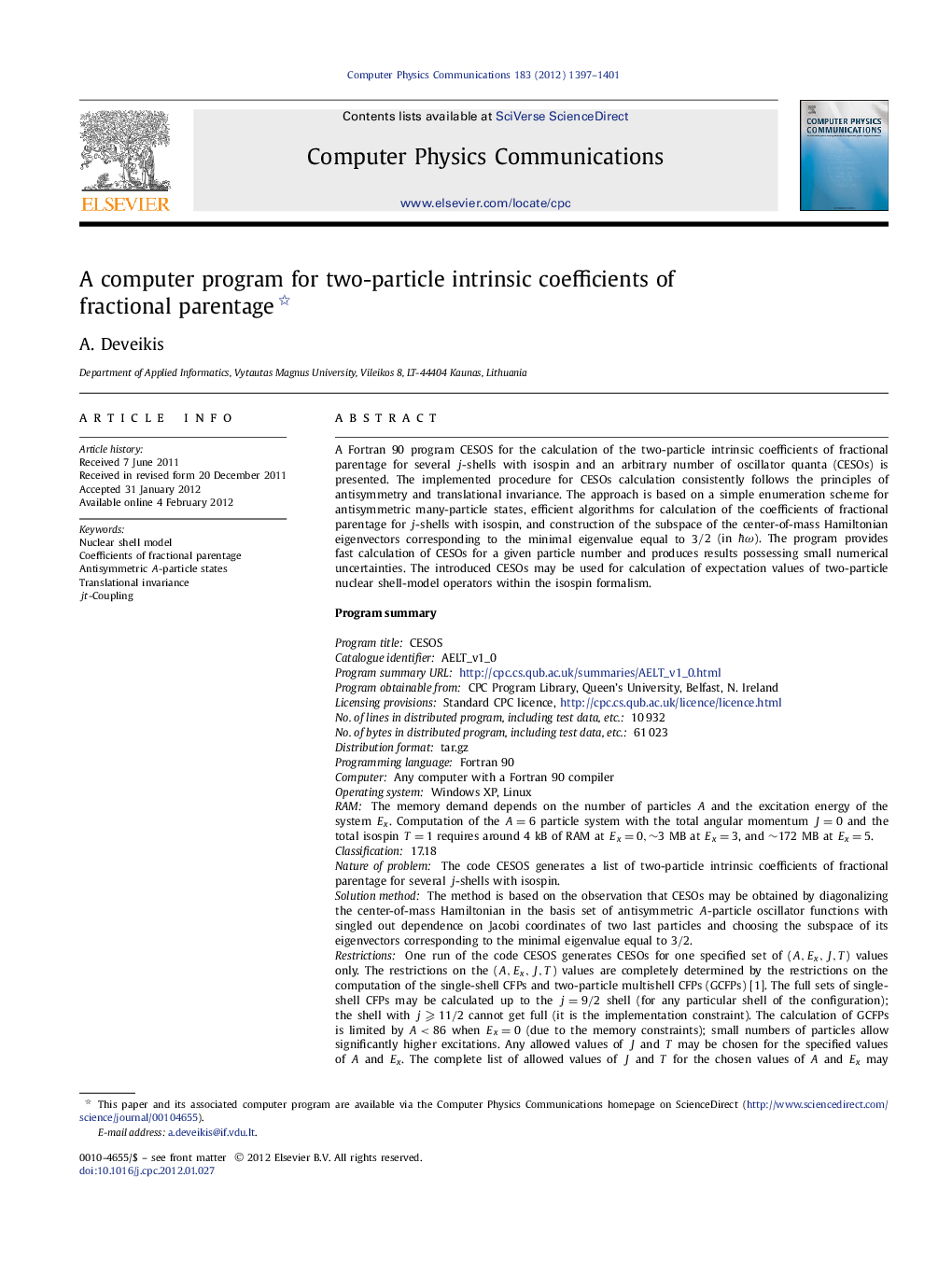| کد مقاله | کد نشریه | سال انتشار | مقاله انگلیسی | نسخه تمام متن |
|---|---|---|---|---|
| 503449 | 863766 | 2012 | 5 صفحه PDF | دانلود رایگان |

A Fortran 90 program CESOS for the calculation of the two-particle intrinsic coefficients of fractional parentage for several j-shells with isospin and an arbitrary number of oscillator quanta (CESOs) is presented. The implemented procedure for CESOs calculation consistently follows the principles of antisymmetry and translational invariance. The approach is based on a simple enumeration scheme for antisymmetric many-particle states, efficient algorithms for calculation of the coefficients of fractional parentage for j-shells with isospin, and construction of the subspace of the center-of-mass Hamiltonian eigenvectors corresponding to the minimal eigenvalue equal to 3/2 (in ℏω). The program provides fast calculation of CESOs for a given particle number and produces results possessing small numerical uncertainties. The introduced CESOs may be used for calculation of expectation values of two-particle nuclear shell-model operators within the isospin formalism.Program summaryProgram title: CESOSCatalogue identifier: AELT_v1_0Program summary URL:http://cpc.cs.qub.ac.uk/summaries/AELT_v1_0.htmlProgram obtainable from: CPC Program Library, Queenʼs University, Belfast, N. IrelandLicensing provisions: Standard CPC licence, http://cpc.cs.qub.ac.uk/licence/licence.htmlNo. of lines in distributed program, including test data, etc.: 10 932No. of bytes in distributed program, including test data, etc.: 61 023Distribution format: tar.gzProgramming language: Fortran 90Computer: Any computer with a Fortran 90 compilerOperating system: Windows XP, LinuxRAM: The memory demand depends on the number of particles A and the excitation energy of the system ExEx. Computation of the A=6A=6 particle system with the total angular momentum J=0J=0 and the total isospin T=1T=1 requires around 4 kB of RAM at Ex=0,∼3 MBEx=0,∼3 MB at Ex=3Ex=3, and ∼172 MB∼172 MB at Ex=5Ex=5.Classification: 17.18Nature of problem: The code CESOS generates a list of two-particle intrinsic coefficients of fractional parentage for several j-shells with isospin.Solution method: The method is based on the observation that CESOs may be obtained by diagonalizing the center-of-mass Hamiltonian in the basis set of antisymmetric A-particle oscillator functions with singled out dependence on Jacobi coordinates of two last particles and choosing the subspace of its eigenvectors corresponding to the minimal eigenvalue equal to 3/2.Restrictions: One run of the code CESOS generates CESOs for one specified set of (A,Ex,J,TA,Ex,J,T) values only. The restrictions on the (A,Ex,J,TA,Ex,J,T) values are completely determined by the restrictions on the computation of the single-shell CFPs and two-particle multishell CFPs (GCFPs) [1]. The full sets of single-shell CFPs may be calculated up to the j=9/2j=9/2 shell (for any particular shell of the configuration); the shell with j⩾11/2j⩾11/2 cannot get full (it is the implementation constraint). The calculation of GCFPs is limited by A<86A<86 when Ex=0Ex=0 (due to the memory constraints); small numbers of particles allow significantly higher excitations. Any allowed values of J and T may be chosen for the specified values of A and ExEx. The complete list of allowed values of J and T for the chosen values of A and ExEx may be generated by the GCFP program – CPC Program Library, Catalogue Id. AEBI_v1_0. The actual scale of the CESOs computation problem depends strongly on the magnitude of the A and ExEx values. Though there are no limitations on A and ExEx values (within the limits of single-shell CFPs and multishell CFPs calculation), however the generation of corresponding list of CESOs is the subject of available computing resources. For example, the computing time of CESOs for A=6A=6, JT=10JT=10 at Ex=5Ex=5 took around 14 hours. The system with A=11A=11, JT=1/23/2 at Ex=2Ex=2 requires around 15 hours. These computations were performed on Pentium 3 GHz PC with 1 GB RAM [2].Unusual features: It is possible to test the computed CESOs without saving them to a file. This allows the user to learn their number and approximate computation time and to evaluate the accuracy of calculations.Additional comments: The program CESOS uses the code from GCFP program for calculation of the two-particle multishell coefficients of fractional parentage.Running time: It depends on the size of the problem. The A=6A=6 particle system with the JT=01JT=01 took around 31 seconds on Pentium 3 GHz PC with 1 GB RAM at Ex=3Ex=3 and about 2.6 hours at Ex=5Ex=5.References:[1]A. Deveikis, A. Juodagalvis, Comp. Phys. Comm. 179 (2008) 607.[2]A. Deveikis, A. Fedurtsya, Phys. Part. Nucl. Lett. 8 (2011) 484.
Journal: Computer Physics Communications - Volume 183, Issue 6, June 2012, Pages 1397–1401